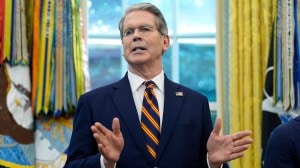WTO chief urges countries to break Doha deadlock
Says contentions can be resolved with leadership,pragmatism and determination.
In a last-ditch effort to put Doha round trade negotiations back on track,World Trade Organisation (WTO) Director-General Pascal Lamy today called upon all member countries of the organisation to come forward for resolving the contentions with leadership,pragmatism and determination.
We cant give up because of steep slope or long path, Lamy emphasised,adding that WTO is a member-driven organisation and its negotiations are a collective enterprise. He was speaking at the inaugural function of Regional Trade Policy Course 2011,at the Indian Institute of Foreign Trade,here today.
Lamy is on a two-day visit to India during which he is scheduled to meet with Commerce and Industry Minister Anand Sharma and interact with dozen-odd CEOs over lunch on Tuesday. The visit is being seen as an attempt by Lamy to revive negotiations now being termed by some as a failure. At the same time questions are being raised on the role of the WTO in multi-lateral trade.
Even after decade-long negotiations,the Doha talks have moved at snails pace because the US has,so far,refused to cede ground on issues like cotton subsidy to farmers,and concession to least developed countries,or LDCs.
At this stage,consensus looks far-fetched as the US prepares for elections next year. The US also does not want to increase the duty-free,quota-free (DFQF) access to goods from LDCs along with trade facilitation because it would be a task to convince the senators in the country battling a severe economic downturn.
Unable to deliver the promise of concluding the Doha round by 2010-end,Lamy is likely to seek support from India for developing a strategy to put forth on the table when WTO ministerial conference takes place in Geneva in December.
The WTO chief would try to work out some package for LDCs and pave way for trade facilitation like easing customs norms for trade, sources said.
Sharma said there is a need to stay focussed on the developmental dimension of the round as the terms of the discourse cant be changed.
Developing countries are being called upon to pay an unconscionably high price to conclude the round. This certainly was not our expectation and our commitment when we agreed to participate in the round, the minister said.
He also emphasised that the faith of people in multilateral institutions must be sustained and therefore we must not allow this round to collapse.
The European Union,though not as vehement as the US,has also been voicing its concern over the fish subsidy. Developing countries,on the other hand,have been maintaining that whatever was agreed under the Swiss formula is good enough and that should be respected.
Photos



- 01
- 02
- 03
- 04
- 05




























